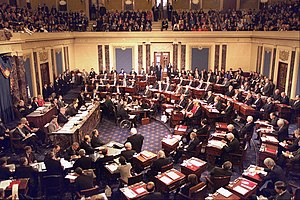Quote:Earlier on Wednesday, Mueller spoke about the investigation. The special counsel refused to exonerate President Trump on obstruction of justice while claiming that criminally charging the president was “not an option.”
“Under long-standing department policy, a president cannot be charged with a federal crime while he is in office. That is unconstitutional. Even if the charge is kept under seal and hidden from public view, that, too, is prohibited,” he said in his remarks.
https://en.wikipedia.org/wiki/Impeachment_of_Bill_ClintonImpeachment of Bill Clinton
From Wikipedia, the free encyclopedia

Floor proceedings of the U.S. Senate during the trial of President Bill Clinton in 1999, Chief Justice William Rehnquist presiding. House managers are seated beside the quarter-circular tables on the left and the president's personal counsel on the right.
The impeachment of Bill Clinton, the 42nd President of the United States, was initiated in December 1998 by the House of Representatives and led to a trial in the Senate on two charges, one of perjury and one of obstruction of justice.[1] These charges stemmed from a sexual harassment lawsuit filed against Clinton by Paula Jones. Clinton was subsequently acquitted of these charges by the Senate on February 12, 1999.[2] Two other impeachment articles – a second perjury charge and a charge of abuse of power – failed in the House.
Leading to the impeachment, Independent Counsel Ken Starr turned over documentation to the House Judiciary Committee. Chief Prosecutor David Schippers and his team reviewed the material and determined there was sufficient evidence to impeach the president. As a result, four charges were considered by the full House of Representatives; two passed, making Clinton the second president to be impeached, after Andrew Johnson in 1868, and only the third against whom articles of impeachment had been brought before the full House for consideration (Richard Nixon resigned from the presidency in 1974, while an impeachment process against him was underway).
The trial in the United States Senate began right after the seating of the 106th Congress, in which the Republican Party held 55 Senate seats. A two-thirds vote (67 senators) was required to remove Clinton from office. Fifty senators voted to remove Clinton on the obstruction of justice charge and 45 voted to remove him on the perjury charge; no member of his own Democratic Party voted guilty on either charge. Clinton, like Johnson a century earlier, was acquitted on all charges.

 Forum
Forum

 Home
Home 

 Album
Album 

 Help
Help

 Search
Search

 Recent
Recent 

 Rules
Rules 

 Login
Login

 Register
Register





 Pages:
Pages: 

